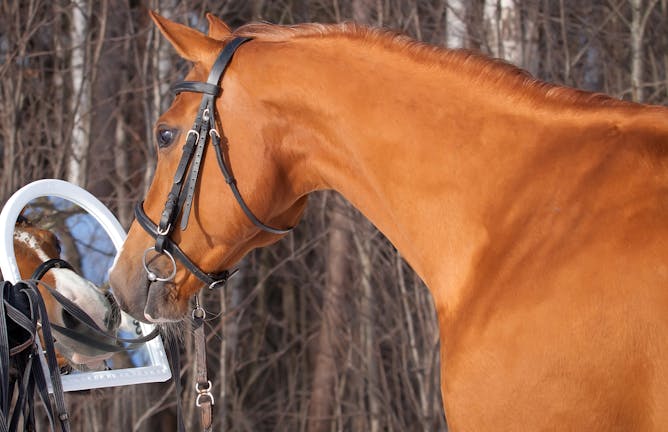|
|
|
|
Sometimes my dogs will appear to recognise themselves in the mirror. They might walk past a shiny surface outside or glance at a mirror in my house and take an interest in what they’re seeing in the reflection. Their ears might prick up or their head will tilt in curiosity. But, it turns out, it takes more than just looking in a mirror for an animal to recognise itself, and only a few animals have the ability.
The test, sometimes called the mirror test or the mark test, involves scientists drawing marks on the animals. If the animals then show an interest in that mark when they see their reflection, by trying to touch that part of their body, the conclusion is they’ve recognised themselves. In a recent study, horses passed the test, joining bottlenose dolphins, magpies and elephants in the exclusive list. But not dogs.
In the UK, new regulation and a recent court ruling are set to push the so-called gig economy into retreat by making it harder for companies such as Uber and Deliveroo to class the people who work for them as self-employed, with big implications for liberal capitalism. Meanwhile, in India, politicians are discussing whether last names revealing people’s caste, religious, or cultural backgrounds should be kept hidden during job recruitment to tackle the country’s centuries-old caste-ism.
|
Abigail Beall
Science and Tech Editor
|

|
|

Looking good.
Shutterstock/Edoma
Ali Boyle, University of Cambridge
Only a few individual animals have recognised themselves in mirrors before.
|

Crash helmets at the ready.
Rowan Freeman/Unsplash
Gerhard Schnyder, Loughborough University; Luda Svystunova, Loughborough University
New changes to employment rules go hand in hand with the recent knocks to Deliveroo and Uber to suggest that a trend is emerging.
|

Workplace discrimination: a young boy of the Dhobi caste washing clothes in Mumbai, India. Dhobis are part of the Dalit or ‘Untouchable’ caste.
Alec Macdonald / Alamy Stock Photo
Srilata Sircar, King's College London; Vignesh Rajahmani, King's College London
A recent report has recommended 'blind' recruitment for India's civil service to prevent caste discrimination. But this is unlikely to solve the problem of entrenched privilege.
|
Politics + Society
|
-
Vanessa Apea, Queen Mary University of London; Yize Wan, Queen Mary University of London
Our research shows that COVID-19 is disproportionately affecting Black and Asian people, and racism is part of the explanation why.
-
Wangu Kanja, University of Birmingham; Heather D. Flowe, University of Birmingham; Nic Cheeseman, University of Birmingham
Removing funding from research-led projects puts people in highly vulnerable situations.
-
Ava Kanyeredzi, University of East London
A pilot project is training Black church leaders in how to better help domestic abuse victims in their congregations.
|
|
Health + Medicine
|
-
Susan Michie, UCL; Chris Bullen, University of Auckland; Jeffrey V Lazarus, Barcelona Institute for Global Health (ISGlobal); John N. Lavis, McMaster University; John Thwaites, Monash University; Liam Smith, Monash University; Salim Abdool Karim, Centre for the AIDS Program of Research in South Africa (CAPRISA); Yanis Ben Amor, Columbia University
COVID-19 variants of concern have changed the game. We need to recognise and act on this to avoid future waves of infections, yet more lockdowns and restrictions, and avoidable illness and death.
-
Beth Fordham, University of Oxford
Cognitive behavioural therapy research contains little data from minority groups. This makes it difficult to know whether this therapy is effective for everyone.
|
|
Science + Technology
|
-
Ekaterina Komendantskaya, Heriot-Watt University; Luca Arnaboldi, University of Edinburgh; Matthew Daggitt, Heriot-Watt University
The public holds self-driving cars to incredibly high safety standards – and we're working to meet them.
-
Mark Lorch, University of Hull
Wax, vials, a coffee capsule and boiling water are the main components of a brand new COVID-19 test.
|
|
Environment + Energy
|
-
Emily Ury, Duke University
As sea levels rise along the Atlantic coast, saltwater is intruding inland, killing trees and turning coastal forests into marshes. Should scientists try to slow the process, or work with it?
|
|
|
|
| |
Featured events
|

|
King's College, Aberdeen, Aberdeenshire, AB24 3FX, United Kingdom of Great Britain and Northern Ireland — University of Aberdeen
|

|
Virtual, York, York, YO10 5DD, United Kingdom of Great Britain and Northern Ireland — University of York
|

|
Online, Online, Oxfordshire, Online, United Kingdom of Great Britain and Northern Ireland — University of Oxford
|

|
Sustainable Places Research Institute, Cardiff University, Cardiff, Cardiff [Caerdydd GB-CRD], CF10 3BA, United Kingdom of Great Britain and Northern Ireland — Cardiff University
|
|
|
|
| |
| |
| |
| |
| |
|
|
|
|
|
|
|